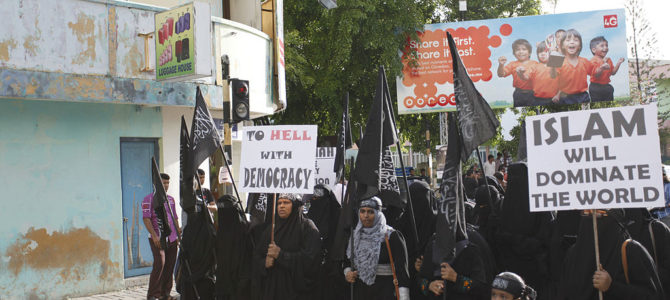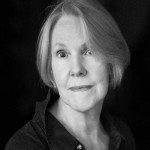
Immersed in current news, we forget that the past is not really “past” in significant ways. Much of the news of the day is not so new at all. In relation to Islam especially, the past is far from over. We are simply watching it emerge from the hibernation it entered after the formal dissolution of the 600- year reign of the Ottoman Empire in 1923.
British writer Hilaire Belloc, writing in the 1930s, put no date on Islam’s re-emergence. But while the West’s attention was elsewhere, he predicted its inevitability:
Millions of modern people . . . have forgotten all about Islam. They have never come in contact with it. They take for granted that it is decaying, and that, anyway, it is just a foreign religion which will not concern them. It is, as a fact, the most formidable and persistent enemy which our civilization has had, and may at any moment become as large a menace in the future as it has been in the past.
“The Great and Enduring Heresy of Mohammed” was one of seven essays in his “The Great Heresies.” He wrote from the standpoint of an historian and Catholic apologist examining the effects of the great heresies of the past (i.e. Arianism, Albigensianism) on the Western world. In these days of white-glove ecumenism and interfaith dialogue, Belloc’s pre-conciliar disdain for non-Catholic religions has eclipsed his once-eminent status as one of the most accomplished men of letters in early twentieth century England.
Catholics themselves are uneasy quoting Belloc these days. And that is too bad. His insight into Islam at a time England was preoccupied—with Hitler, communism abroad, and a fascist movement at home—was exceptional. And penetrating.
Why Islam Is Strong
As early as 1937, Belloc foresaw Islam’s capacity to reverse its then-current diminution as a geopolitical force: “Perhaps that change will be deferred, but change there will be, continuous and great. Nor does it seem probable that at the end of such a change, especially if the process be prolonged, Islam will be the loser.”
Islam will not lose because it has not suffered the West’s spiritual decline: “And in the contrast between the religious certitudes still strong throughout the Mohammedan world . . . particularly in Palestine–lies our peril.” Decades later, prominent Pakistani jurist and scholar Mahmood Ahad Ghazi said much the same:
Islam is the most dynamic force today because, unlike other major religions, it hasn’t succumbed to secularism. It doesn’t divide human life between the religious and the secular, the spiritual and the totality of human existence. Only Islam is the route to victory.
Belloc saw Islam as less a new religion than a heresy that selected among Christian doctrines. He ascribes its perdurance and vitality, in part, to the fact that, unlike previous heresies, it was sui generis. However much it borrowed from the surrounding Christendom, it did not arise within it. It was a distortion but never a defection from any Western reality. Consequently, it did not carry the seeds of the West’s capacity for methodical doubt and self-accusation: “In Islam, there has been no such dissolution of ancestral doctrine—or, at any rate, nothing corresponding to the universal break-up of religion in Europe.”
From the beginning, there was nothing outside itself to which those first fierce armies of nomad Arabs—later Mongols from Asia and North African Berbers—might eventually return. Or which might blunt fanatical excess. Belloc described the Mongol waves (termed simply “the Turk” in the Middle Ages) with no apology to ethnic sensibilities:
They are indomitable fighters and at the same time almost purely destructive. They massacre by the millions; they burn and destroy; they turn fertile districts into deserts. They seem incapable of creative effort.
. . . This body of Islam attacking Christendom from beyond its frontiers and not breaking it up from within happened to be continually recruited with fighting material of the strongest kind and drafted in from the pagan outer darkness.
Polite people do not talk that way any more. We are too demure to speak of fighting material. All multiculturalists now, we frown at pagan outer darkness. Not to think kindly of our ancient enemy or understand his grievances is a moral defect. Islam, free of such cultural inhibition, makes it—in Belloc’s term—“unconvertible.” And he was right. The sway of conversion—aided by terror alongside the juridical and economic subjection of dhimmis—has moved in Islam’s favor over the centuries. It is impossible not to catch a note of grudging regard in Belloc’s remarks on Islam’s tenacity:
Whatever the cause, Mohammedanism has survived, and vigorously survived. Missionary effort has had no appreciable effect upon it. . . . No fragment of Islam ever abandons its sacred book, its code of morals, its organized system of prayer, its simple doctrine.
In view of this, anyone with a knowledge of history is bound to ask himself whether we shall not see in the future a revival of Mohammedan political power, and the renewal of the old pressure of Islam upon Christendom. . . . The final fruit of this tenacity, the second period of Islamic power, may be delayed. But I doubt whether it can be permanently postponed.
Blinded By the Immediate Past
Although Islam sustained itself religiously during the eighteenth and nineteenth centuries, its material and political power decayed. In the matter of weaponry it decayed most of all. Belloc wrote at the nadir of Islamic power. No one at the time could have imagined the West eventually arming its ancient enemy, surrendering its technological and military advantage:
The recrudescence of Islam, the possibility of that terror under which we lived for centuries reappearing, and of our civilization again fighting for its life against what was its chief enemy for a thousand years, seems fantastic. Who in the Mohammedan world today can manufacture and maintain the complicated instruments of modern war? Where is the political machinery whereby the religion of Islam can play an equal part in the modern world?
I say the suggestion that Islam may re-arise sounds fantastic— but this is only because men are always powerfully affected by the immediate past. One might say they are blinded by it.
That blindness announces itself in the docile political correctness rampant among churchmen. William Kilpatrick, heir to Belloc’s clear eye, wrote a devastating column in The Catholic World Report this June: “Islam and the Church: Have Islamists Hijacked the Discussion?” His essay was triggered by the National Catholic-Muslim Dialogue held in Chicago on March 7 and 8. An initiative of the U.S. Conference of Catholic Bishops, it reaffirms the USCCB’s 2014 statement that reasserted, in part, the Catholic Church’s high regard for Muslims. Despite centuries of conflict, the bishops intoned, it is time to “forget the past,” and join “our Muslim brothers and sisters” in mutual understanding.
The quality of that understanding can be gauged by the nature of the bishops’ partners in dialogue. Kilpatrick cites the two primary dialoguees: the Islamic Society of North America and the Islamic Circle of North America. Both are said to have ties to Hamas, the Muslim Brotherhood, and Jamaat-e-Islami. This last is an Islamic revivalist movement founded in India, modeled after the Muslim Brotherhood, and known for promoting religious extremism. The Hindu American Association calls it a “nexus of terror.”
We Drop Religion At Our Existential Peril
Belloc understood what modernity blithely ignores: cultures spring from religions. Religion is a vital sustaining force. Its disintegration entails the historic decay of the culture that carries it. Belloc saw that most clearly in the decomposition of Christianity. And he warned of the implications of that breakdown: “There is no reason whatever why it [Islam] should not learn its new lesson and become our equal in all those temporal things which now alone give us our superiority over it—whereas in Faith we have fallen inferior to it.”
Eighty years on, faith in the spiritual ends of our civilization has fallen further. Douglas Murray, in “The Strange Death of Europe,” echoes Belloc when he writes that Western liberal societies owe more than they care to admit to the religion from which they arose. Contemporary talk of “European values” is a dead end without reference to the Judeo-Christian heritage from which Western values arose, and which guaranteed their survival. Murray is blunt: “Europe has lost its foundational story.” He continues:
For centuries in Europe one of the great—if not the greatest source of [cultural] energy came from the spirit of the continent’s religion. It drove people to war and stirred them to defense. It also drove Europe to the greatest heights of human creativity.
In the vacuum of belief, Islam ascends—as Belloc envisioned it would.
“Religion is the key of history,” said Lord Acton. It is the key of our future as well. But it is uncertain which civilization holds the key. A secular West is caught in an impasse, its own freedoms and God-given rights deadlocked in the wreckage of beliefs it has discarded.









